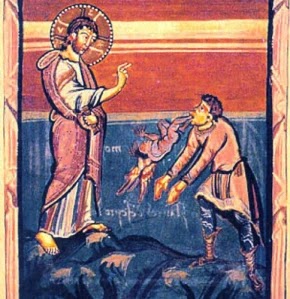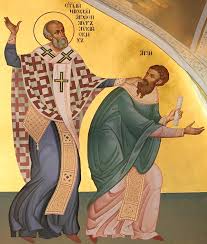'Jesus and his disciples arrived at the country of the Gerasenes, which is opposite Galilee. As he stepped out on land, a man of the city who had demons met him. For a long time he had worn no clothes, and he did not live in a house but in the tombs. When he saw Jesus, he fell down before him and shouted at the top of his voice, "What have you to do with me, Jesus, Son of the Most High God? I beg you, do not torment me" -- for Jesus had commanded the unclean spirit to come out of the man. (For many times it had seized him; he was kept under guard and bound with chains and shackles, but he would break the bonds and be driven by the demon into the wilds.) Jesus then asked him, "What is your name?" He said, "Legion"; for many demons had entered him. They begged him not to order them to go back into the abyss.
Now there on the hillside a large herd of swine was feeding; and the demons begged Jesus to let them enter these. So he gave them permission. Then the demons came out of the man and entered the swine, and the herd rushed down the steep bank into the lake and was drowned.
When the swineherds saw what had happened, they ran off and told it in the city and in the country. Then people came out to see what had happened, and when they came to Jesus, they found the man from whom the demons had gone sitting at the feet of Jesus, clothed and in his right mind. And they were afraid. Those who had seen it told them how the one who had been possessed by demons had been healed. Then all the people of the surrounding country of the Gerasenes asked Jesus to leave them; for they were seized with great fear. So he got into the boat and returned. The man from whom the demons had gone begged that he might be with him; but Jesus sent him away, saying, "Return to your home, and declare how much God has done for you." So he went away, proclaiming throughout the city how much Jesus had done for him.'
--Luke 8: 26-39
Years ago I was having lunch on a Sunday. I was in my collar, and after I placed my order, the young waiter said to me, “There’s something I always wanted to ask a priest!” Here it comes. “Do you, like, watch exorcism movies?” Oh yeah, all the time! No, actually, I said, I’ve only seen a few – I don’t do horror – but one that I had recently seen that I enjoyed was The Rite. I liked that one, I told him. One of the things I appreciate about that movie is that he makes a big deal of showing that the first action taken by the priest in an exorcism is to get the demon to say its name.
Why is this important? Because naming something gives one a sense of ownership or control over it. You can call it out. Think about when you get a dog and how important it is to name it, in order to get it to listen and obey. Getting the demon to say its name is really difficult, as any good exorcism movie will show you, but once that happens, then healing can begin.
When Jesus confronts a Gerasene man who has been possessed by a demon, the first thing he does is ask for its name. “Legion,” it replies, “for we are many.” Once the name is spoken, then Jesus can do his work; he cures the man, sending the demons into a herd of pigs, and leaving the man “in his right mind”, as the text says.
But what exactly was this legion? Biblical scholars say the name is a reference to the Roman legions that tormented and tortured Jesus’ people, and all others whom they conquered.. More modern readers of this text have speculated that the Gerasene man may have been bipolar or suffering from what we might today call paranoid schizophrenia or dissociative personality disorder. Regrettably, the Church for centuries dealt with people suffering from and living with these and other such conditions as if they were, in fact, possessed by demons, curable only through exorcisms in the name of Jesus. And when the exorcisms didn’t fix the problem, society resorted to treatments like shock therapy to control the outbursts, and throwing folks into sanitariums that hid the mentally ill away from the world, the way the Gerasenes hid the so-called “demoniac” in the tombs and shackled him with chains. The harm inflicted on the mentally ill is a sin from which the Church continues to repent.
Jesus neither condemns this man, nor does he try to control him. He meets him with compassion, not fear or judgment. This man, who has no name, mind you – he has no identity apart from his affliction – is not seen by Jesus as a drain on society or an inconvenience to be hidden away, but as someone who is fighting a great battle within himself. The text even tells us that he was dealing with the legion for a very long time. And after meeting the man where he is, Jesus gets him to name his demon – in this case, Legion – but he doesn’t treat him harshly. Whereas those around the man had shunned and shamed him, Jesus offers healing and peace of mind, and in a twist, he actually grants the demons’ request by casting Legion into the pigs, rather than into the nothingness of the Abyss. It’s also a beautiful piece of irony that the demon named for the Romans – hated enemies of the Jews – would prefer to inhabit pigs – unclean and vile creatures to Jews – only to run off a cliff and die. Who says the Bible isn’t good literature?
Why show such mercy to this man, rather than condemn him – which is the social norm – or call the demon out violently – like in those exorcism movies? I wonder if, perhaps, Jesus treats him this way because he recognizes the strength within this man to fight and struggle for so long with something inside him that he cannot understand or control. Consider that the moment Jesus steps onto land, the man runs out to meet him, pleading for Jesus not to torment him. This is his cry for help, his rock-bottom, if you will, and like most of our own cries for help it’s not as simple as, “I’m having a problem, please help me,” but instead it’s an agonizing plea coming from a place of pain and fear, which no one but Jesus understands. In the example of this man, we are reminded that there is no weakness, no shame, in seeking someone out for help. And our prayer today is that we may meet a suffering brother or sister in the same manner as Jesus, without judgment or shame, and with compassion and mercy.
So many of us have had, or may still have, such struggles. We might even use the word “demons” to describe them: “I’m battling my demons,” we may say, of mental illness, addiction, PTSD, the list goes on, though it should be reiterated that such conditions are not, I repeat, not demonic. Still, the first step for any of us in facing our personal struggles and healing from them is to name them. I have had my own battles with PTSD, especially over the last four years or so, and my body very much has kept the score. It has taken me all that time to name that and get appropriate help from therapists, spiritual directors, and trusted colleagues. There is no shame in what has happened to me, or to any of you, and there is no shame in asking for help, though sometimes, like the Gerasene man, we may not know how.
After receiving his healing, the man sits at Jesus’ feet, clearly a new person, with a new outlook on life. He wants to go with Jesus, but he refuses, telling the man to stay where he is. Remember that the Gerasenes were not exactly pleased about this man’s healing. A whole herd of pigs was lost because of it – that’s an economic repercussion right there – and their response toward Jesus was to run him out of town, since the Gerasenes weren’t Jews and didn’t appreciate an outsider coming in and upsetting things. Sometimes our journey toward healing and wholeness takes us places that others don’t like very much. Loved ones may respond dejectedly when we come out of our healing process and emerge a new person – perhaps with a new name, an entirely new outlook on life. There is something holy and sacred in the call of this new person to remain with his people, to educate them, to love them, to help others heal the same way Jesus healed him.
In this particularly volatile and fearful time, there are voices trying to possess and discourage us so numerous that we might call them Legion. We may, at times, feel so stuck that we prefer the struggle to the gains, the demon we know to the freedom we do not. Whether true for individuals or systems – especially churches – we learn to cope with dysfunction, leading to a fear of change, of being exorcised of the kinds of forces that hold us back from being our truest selves. Yet against them all speaks the still, small, yet mighty voice of Jesus, who still reminds us of our belovedness, meets us where we are, and helps us stay rooted in the calling that is set before us.. It begins with naming our struggles and accepting Jesus’ invitation to a journey of transformation and healing, towards resurrection and newness of life. For all of us, whatever struggles we are facing, that is good news.












